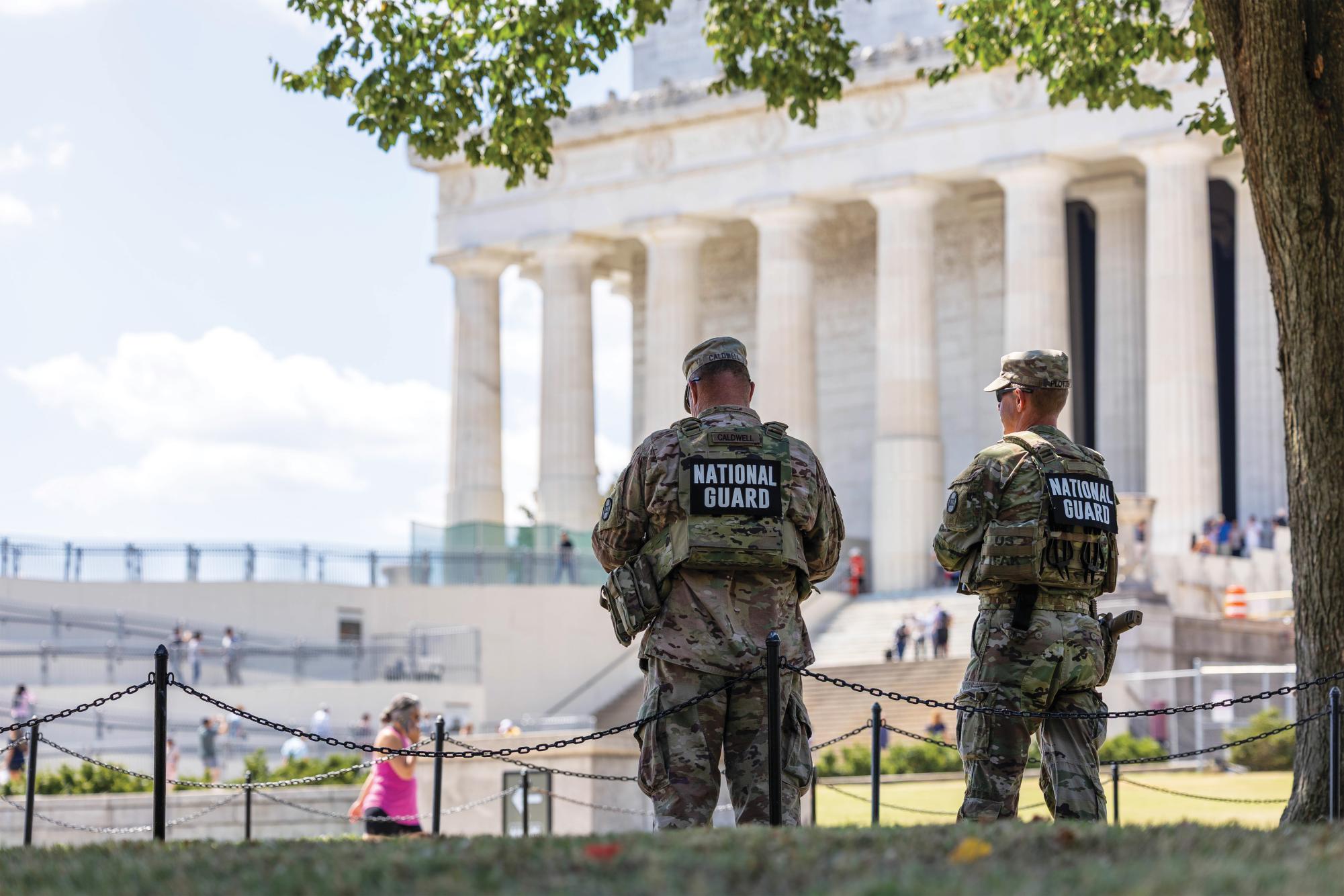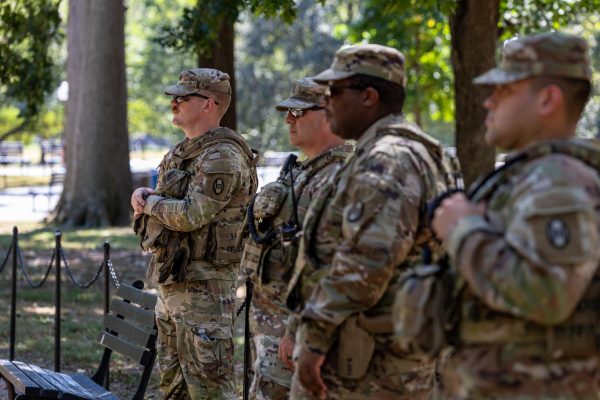Georgetown University students expressed fear and frustration over an increased police presence in Washington, D.C., and on campus as they returned to the District for the academic year.
Citing a crime emergency in D.C., President Donald Trump deployed 850 federal agents and federalized D.C.’s Metropolitan Police Department (MPD) on Aug. 11. A total of 2,200 National Guard troops have also been deployed in the city, including 900 members of the District of Columbia National Guard and troops from various states.

William Mead-McCaughan (CAS ’27), a Georgetown student who grew up in the District, said Trump’s characterization of the area as dangerous and crime-ridden does not accurately represent residents’ experience of the city.
“People who I know who’ve grown up all around the city — it’s their home, and it’s not somewhere that they think of as this awful place,” Mead-McCaughan told The Hoya.
Federal agents first appeared to be present on the Georgetown University main campus Aug. 13, when federal agents were also seen throughout the Georgetown neighborhood. According to photos obtained and reviewed by The Hoya, at least six federal agents were seen walking on the north end of campus.
Federal agents also appeared to be on campus Aug. 27, the university’s first day of classes, according to a video obtained and reviewed by The Hoya. The video and descriptions of the sighting suggest four uniformed agents drove south on Tondorf Road in an unmarked white car around 7 p.m.
In both cases, it remains unclear why federal agents were on campus and whether they were on duty.
While Georgetown is a privately held property, areas of campus — such as Healy Lawn, Red Square and some non-residential buildings — are open for public access.
Federal law enforcement officers may access the parts of campus open to the public, but may not enter private areas without a judicial search warrant. The university’s Office of General Counsel offers guidelines for faculty and staff interacting with law enforcement officers.
Darius Wagner (CAS ’27), who saw the agents Aug. 27, said he was worried students may not know when federal law enforcement is on campus.
“I am acutely concerned about this because of how easy they were to miss,” Wagner told The Hoya. “The only reason I saw them was because I was crossing the street, and I had to look at the car as it passed me.”
Wagner — who is also the vice president of the Georgetown University Student Association (GUSA), Georgetown’s student government — said federal agents’ presence is an intimidation tactic from the Trump administration.
“It just really pissed me off,” Wagner said. “This is nothing but sheer intimidation — trying to scare students who exist on a college campus that values diversity, that criticizes the government, things that he doesn’t like.”
Until last month, MPD cooperation with federal immigration officers was largely barred by a 2020 D.C. law. On Aug. 14, MPD Chief Pamela Smith signed an executive order allowing D.C. police to share information on people not in custody with Immigration and Customs Enforcement (ICE), a federal agency responsible for carrying out immigration policy, as well as aid federal agencies with the transportation of detainees.
D.C. Mayor Muriel Bower also issued an executive order on Sept. 2 requiring local law enforcement to indefinitely cooperate with federal agents to the highest extent allowed under D.C. law.
But D.C. Attorney General Brian Schwalb sued the Trump administration Sept. 4 over its deployment of the National Guard, describing it as an illegal “military occupation” that threatened the District.

Ian Crowley (CAS ’28) said he believes federal law enforcement on campus places international, immigrant and undocumented students at higher risk than other students.
“I am definitely scared and concerned on behalf of some my peers who may not be in that position of privilege that I am, and who may not feel as comfortable even sharing their experiences or sharing how they’re feeling in this time because of their documentation status, because of the color of their skin or because of a myriad of other factors,” Crowley told The Hoya.
Ignacio Loaiza (CAS, McCourt ’28) said federal agents’ presence concerns him as he believes it targets people who are also of Latino descent.
“Having family from Mexico makes the situation feel very personal,” Loaiza wrote to The Hoya. “I remember being very young and hearing early rhetoric about Mexicans as ‘rapists’ and ‘criminals’ and that always stuck with me. Seeing that they’ve now militarized this rhetoric and people are being profiled on the streets does feel personal.”
Following the MPD directive to share non-arraigned persons’ immigration status with ICE, the number of detentions in D.C. increased from an average of 12 per week in the first six months of Trump’s presidency to 300 detainments between Aug. 7 and Aug. 23. Throughout the country, on-the-street arrests of Latine immigrants without any criminal history increased to 17% of all ICE arrests in July 2025, up from 3.4% in December 2024.
On Aug. 14, university Vice President for Public Affairs Erik Smulson sent a community-wide email that reaffirmed Georgetown’s commitment to upholding students’ rights while noting the cooperation between the Georgetown University Police Department (GUPD) and MPD.
Smulson said the university does not anticipate changes to its relationship with MPD.
“You may notice an increase in law enforcement presence throughout the city, including in areas of our campuses that are open to the general public,” Smulson wrote in the email. “As always, we expect any law enforcement activity on our campuses to be conducted in a manner that respects the rights of our community members and fully complies with due process requirements.”
For Wrigley Zbyszewski (CAS ’29), who said she saw two federal agents on 37th Street NW during her first weekend on campus, the federal policing of the city has added anxiety to her transition into Georgetown.
“Maybe other kids who have been here for a little bit, who are from D.C. or Virginia are more used to seeing various types of federal agents around,” Zbyszewski told The Hoya. “But for kids who are not from here, coming into any sort of police presence can be unsettling.”
Zbyszewski said she has to take extra precautions that first-years at other universities do not need to take.
“When I’m introducing myself to girls on my floor, we’re exchanging numbers of our parents, in case something happens and we need to contact someone,” she said. “It’s just that extra layer of stress.”
Loaiza said that although the presence of federal agents on the university grounds feels daunting, it has united students across the campus.
“It’s really easy to feel powerless in this situation, especially when the force one is fighting against is the federal government, but people are coming together and are being unified by this issue” Loaiza wrote.